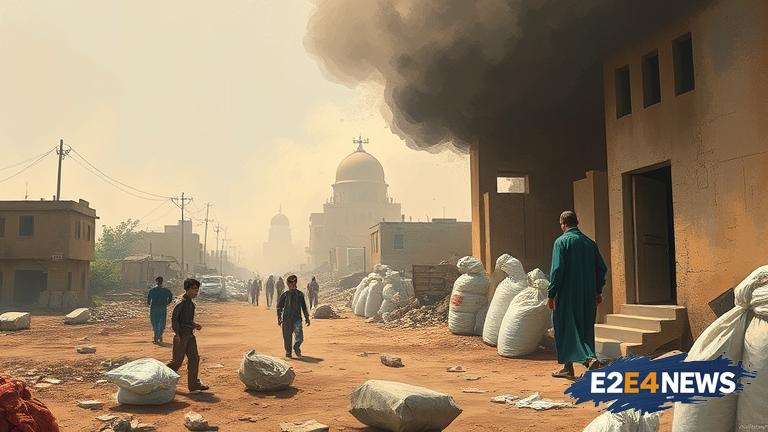The Gaza Strip is in the midst of a devastating humanitarian crisis, with the number of civilian casualties continuing to rise due to a severe shortage of essential supplies, including food, medicine, and burial shrouds. The situation has become increasingly dire, with many Gazans struggling to survive amidst the ongoing conflict. The lack of access to basic necessities has led to a significant increase in hunger-related deaths, with many families forced to rely on meager rations to sustain themselves. The shortage of medical supplies has also exacerbated the crisis, with hospitals and healthcare facilities struggling to provide adequate care to the wounded. Furthermore, the scarcity of burial shrouds has added to the distress of families who have lost loved ones, as they are forced to bury their dead in makeshift shrouds or even without any covering at all. The humanitarian crisis in Gaza has been exacerbated by the ongoing conflict, which has resulted in the destruction of critical infrastructure, including homes, schools, and hospitals. The blockade of the Gaza Strip by Israel and Egypt has also severely limited the entry of essential supplies, including food, medicine, and construction materials. The international community has been criticized for its response to the crisis, with many arguing that more needs to be done to address the humanitarian needs of the Gazan population. The United Nations has warned of a potential catastrophe in Gaza, with the agency’s Secretary-General, António Guterres, calling for an immediate end to the violence and the establishment of a lasting ceasefire. The European Union has also expressed its concern over the situation in Gaza, with the bloc’s foreign policy chief, Josep Borrell, urging all parties to respect international humanitarian law. Despite the growing international outcry, the situation in Gaza remains dire, with many civilians caught in the crossfire and struggling to access basic necessities. The Gaza Strip’s economy has also been severely impacted by the conflict, with many businesses forced to close and unemployment soaring. The psychological toll of the conflict on Gazan civilians should not be underestimated, with many experiencing trauma, anxiety, and depression. The international community must take immediate action to address the humanitarian crisis in Gaza, including providing emergency aid and working towards a lasting ceasefire. The establishment of a permanent and independent monitoring mechanism to ensure the protection of civilians and the respect of international humanitarian law is also essential. In addition, the international community must work to address the root causes of the conflict, including the Israeli-Palestinian conflict and the blockade of the Gaza Strip. The situation in Gaza is a stark reminder of the devastating consequences of conflict and the importance of protecting civilians and upholding international humanitarian law. As the crisis deepens, it is imperative that the international community takes decisive action to address the humanitarian needs of the Gazan population and work towards a lasting and just peace. The Gaza Strip’s future hangs in the balance, and it is up to the international community to ensure that the rights and dignity of its people are respected and protected. The world cannot afford to stand idly by as the humanitarian crisis in Gaza continues to unfold. It is time for collective action to address this crisis and ensure that the people of Gaza receive the aid and support they so desperately need. The international community must also recognize the importance of accountability and justice in addressing the humanitarian crisis in Gaza, and work to ensure that those responsible for violations of international humanitarian law are held accountable. Ultimately, the resolution of the humanitarian crisis in Gaza will require a comprehensive and sustained effort from the international community, including the provision of emergency aid, the establishment of a lasting ceasefire, and the addressing of the root causes of the conflict.





